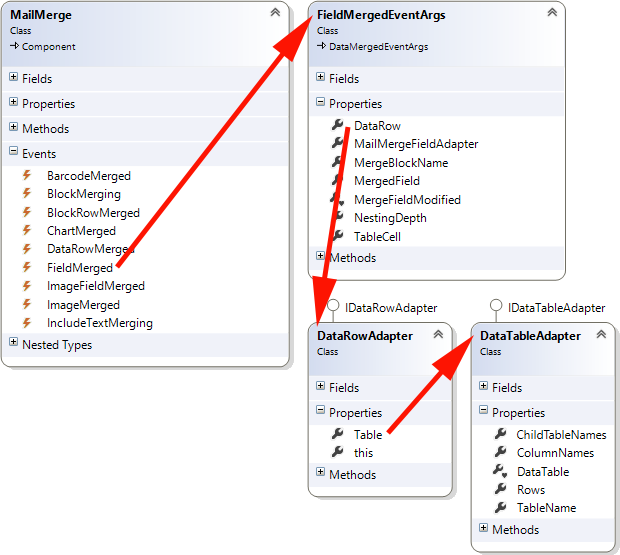MailMerge Improvements in X14: Event Arguments and JSON Data Sources
In version X14 (24.0), the MailMerge class will be improved with new features and enhancements. The MailMerge class is a .NET component that can be used to effortlessly merge template documents with database content in all .NET projects, such as ASP.NET web applications, web services or Windows services. Merge with JSON Data The new method MergeJsonData merges a JSON string into reporting templates. The JSON data can contain either a single object or an array of equally structured objects…

In version X14 (24.0), the MailMerge class will be improved with new features and enhancements. The MailMerge class is a .NET component that can be used to effortlessly merge template documents with database content in all .NET projects, such as ASP.NET web applications, web services or Windows services.
Merge with JSON Data
The new method MergeJsonData merges a JSON string into reporting templates. The JSON data can contain either a single object or an array of equally structured objects (JSON array). The following code snippet merges one merge field (test) with JSON data:
MailMerge mailMerge = new MailMerge();
mailMerge.TextComponent = textControl1;
string json = "{ \"test\":\"TextTest\" }";
mailMerge.MergeJsonData(json);MailMerge Events
The Text Control Reporting Framework is a very flexible framework to merge data into MS Word compatible templates. With a single line of code, the merge process can be started to generate Adobe PDF or MS Word documents.
In order to manipulate the merge process and to inject custom logic, each merge element such as merge fields and merge blocks fire events. These events return the merged field, information about the location of a field and provide access to data that is used to merge the document.
In these events, a DataRowAdapter provides access to the DataTableAdapter which gains access to the child table names, column names, the DataTable, the data rows and the table name. Additionally, the new FieldMergedEventArgs property MergeBlockName returns the block name in case the field is embedded in a merge block. The NestingDepth property returns the nesting level of the field.
These new properties allow a very flexible interaction with the merge process.

Stay tuned for more details!
Reporting
The Text Control Reporting Framework combines powerful reporting features with an easy-to-use, MS Word compatible word processor. Users can create documents and templates using ordinary Microsoft Word skills. The Reporting Framework is included in all .NET based TX Text Control products including ASP.NET, Windows Forms and WPF.
Related Posts
ReportingWindows FormsMail Merge
MailMerge: Conditional Rendering of Merge Blocks
Merge blocks can be used to render content conditionally. This article explains different ways to control this.
ReportingWindows FormsMail Merge
DataSourceManager: Using the Ready-to-Use Reporting Dialog Boxes
The Text Control DocumentServer class comes with ready-to-use dialog boxes for various purposes. This article shows how to use them in your application.
Merge Blocks in X16: Filtering, Sorting and Conditional Rendering
Merge blocks have been drastically improved in TX Text Control X16: They can be sorted, filtered and rendered based on conditions.
Preview: JSON Support in MailMerge Version X14 (24.0)
JSON, the acronym for JavaScript Object Notation, is a data format used in modern, web-based applications. It became the de facto standard format to transfer data in web-based applications. In the…
TX Text Control 32.0 Has Been Released
We are pleased to announce the immediate availability of TX Text Control 32.0 for all platforms including ASP.NET, Windows Forms, WPF and ActiveX.

